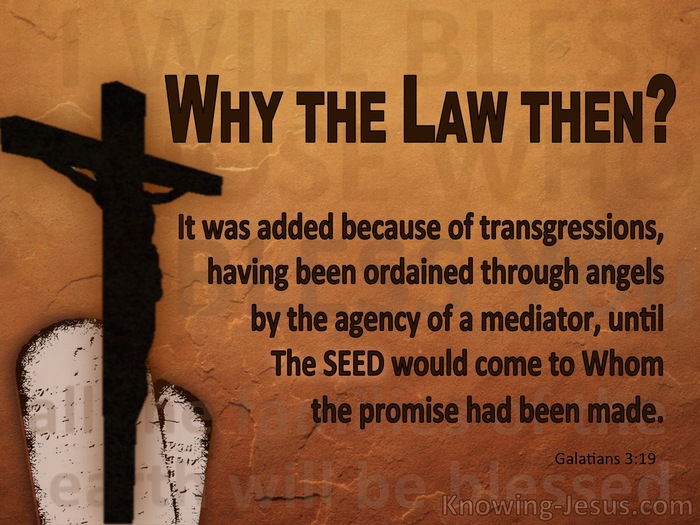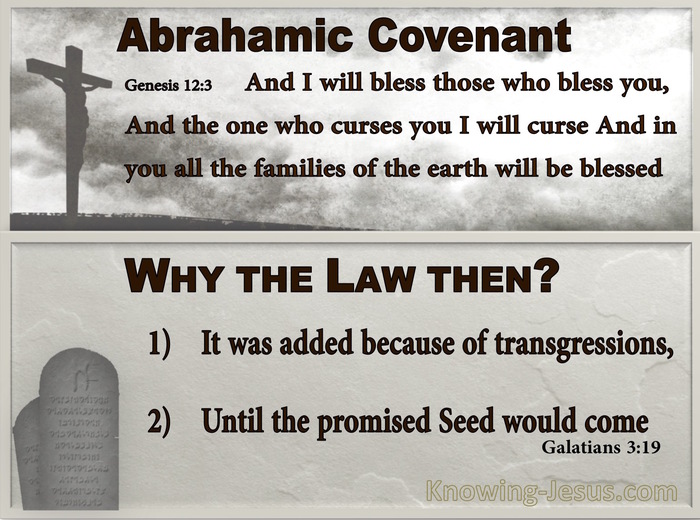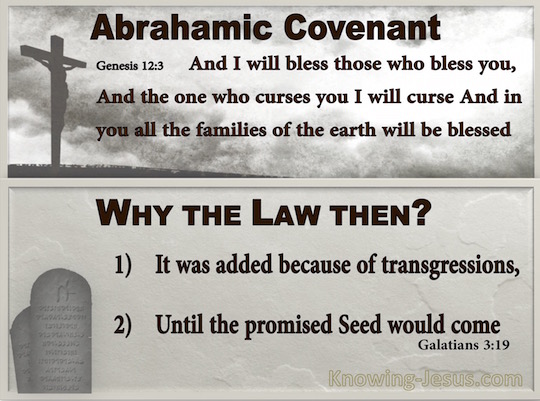Parallel Verses
An Understandable Version
What then is [the benefit of] the law of Moses? It was introduced [as part of God's revelation] in order to define what sin was, until the seed [i.e., Jesus] would come, to whom the promise [of never ending life] was made. The law of Moses was ordained through [the medium of] angels and [delivered] through the hand of an intermediary [i.e., Moses].
New American Standard Bible
King James Version
Wherefore then serveth the law? It was added because of transgressions, till the seed should come to whom the promise was made; and it was ordained by angels in the hand of a mediator.
Holman Bible
Why then was the law given?
International Standard Version
Why, then, was the Law added? Because of transgressions, until the descendant came about whom the promise pertained. It was put into effect through angels by means of a mediator.
A Conservative Version
Why then the law? It was added on account of transgressions, until the seed would come to whom it was promised, which was arranged through heavenly agents in the hand of a mediator.
American Standard Version
What then is the law? It was added because of transgressions, till the seed should come to whom the promise hath been made; and it was ordained through angels by the hand of a mediator.
Amplified
Why, then, the Law [what was its purpose]? It was added [after the promise to Abraham, to reveal to people their guilt] because of transgressions [that is, to make people conscious of the sinfulness of sin], and [the Law] was ordained through angels and delivered to Israel by the hand of a mediator [Moses, the mediator between God and Israel, to be in effect] until the Seed would come to whom the promise had been made.
Anderson New Testament
What, then, was the purpose of the law? It was added on account of transgressions, (till the offspring should come, to whom the promise was made,) having been appointed through the service of angels, in the hand of a mediator.
Bible in Basic English
What then is the law? It was an addition made because of sin, till the coming of the seed to whom the undertaking had been given; and it was ordered through angels by the hand of a go-between.
Common New Testament
Why the Law then? It was added because of transgressions, having been ordained through angels by the agency of a mediator, until the seed would come to whom the promise had been made.
Daniel Mace New Testament
"To what purpose then was the law?" it was added as a check to transgressors, till the offspring should come to whom the promise was made; and it was ordained by angels with the intervention of a mediator.
Darby Translation
Why then the law? It was added for the sake of transgressions, until the seed came to whom the promise was made, ordained through angels in the hand of a mediator.
Godbey New Testament
Then what is the law? It was added on account of the transgressions, until the seed to whom the promise was made should come; being ordained by angels in the hand of a mediator.
Goodspeed New Testament
Then what about the Law? It was a later addition, designed to produce transgressions, until the descendant to which the promise was made should come, and it was enacted by means of angels, through an intermediary;
John Wesley New Testament
Wherefore then was the law? It was added because of transgressions, till the seed should come to whom the promise was made: and it was ordained by angels, in the hand of a mediator.
Julia Smith Translation
What then the law? It was added on account of transgressions, (till the seed come to whom it was promised;) appointed by angels in the hand of a mediator.
King James 2000
Why then the law? It was added because of transgressions, till the descendant should come to whom the promise was made; and it was ordained by angels in the hand of a mediator.
Lexham Expanded Bible
Why then the law? It was added on account of transgressions, until the descendant should come to whom it had been promised, having been ordered through angels by the hand of a mediator.
Modern King James verseion
Why then the Law? It was added because of transgressions, until the Seed should come to those to whom it had been promised, being ordained through angels in the Mediator's hand.
Modern Spelling Tyndale-Coverdale
Wherefore then serveth the law? The law was added because of transgression - till the seed came, to which the promise was made - and it was ordained by angels in the hand of a mediator.
Moffatt New Testament
Then what about the Law? Well, it was interpolated for the purpose of producing transgressions till such time as the Offspring arrived to whom the Promise was made; also, it was transmitted by means of angels through the agency of an intermediary
Montgomery New Testament
To what purpose, then, was the Law? It was imposed later for the sake of transgressions, until the "Offspring" should come to whom the promise had been made. It was arranged through angels by the hand of a mediator.
NET Bible
Why then was the law given? It was added because of transgressions, until the arrival of the descendant to whom the promise had been made. It was administered through angels by an intermediary.
New Heart English Bible
What then is the law? It was added because of transgressions, until the seed should come to whom the promise has been made. It was ordained through angels by the hand of a mediator.
Noyes New Testament
To what end then was the Law? It was added because of transgressions, till the offspring should come to whom the promise belongeth, having been ordained through angels by the hand of a mediator.
Sawyer New Testament
What then? The law was added on account of transgressions, till the offspring should come to which the promise was made, being appointed by angels by the hand of a mediator.
The Emphasized Bible
Why, then, the law? Because of the transgressions, it was added, until such time as the seed should come, unto whom the promise had been made, and was given in charge through messengers, at the hand of a mediator;
Thomas Haweis New Testament
To what end then was the law given? It was given on account of transgressions, until that seed should come to whom the promise was made, being delivered through the ministry of angels into the hand of a mediator.
Twentieth Century New Testament
What, then, you ask, was the use of the Law? It was a later addition, to make men conscious of their wrong-doings, and intended to last only till the coming of that 'offspring' to whom the promise had been made; and it was delivered through angels by a mediator.
Webster
What purpose then serveth the law? It was added because of transgressions, till the seed should come to whom the promise was made; and it was ordained by angels in the hand of a mediator.
Weymouth New Testament
Why then was the Law given? It was imposed later on for the sake of defining sin, until the seed should come to whom God had made the promise; and its details were laid down by a mediator with the help of angels.
Williams New Testament
Then what about the law? It was added later on to increase transgressions, until the descendant to whom the promise was made should come, enacted through the agency of angels in the person of an intermediary.
World English Bible
What then is the law? It was added because of transgressions, until the seed should come to whom the promise has been made. It was ordained through angels by the hand of a mediator.
Worrell New Testament
What, then, is the law? It was added because of the transgressions, until the Seed should come to Whom it had been promised; having been arranged through angels in the hand of a mediator.
Worsley New Testament
What then availeth the law? It was added because of transgressions, till the seed should come, to whom the promise was made; and it was delivered by angels in the hand of a mediator.
Youngs Literal Translation
Why, then, the law? on account of the transgressions it was added, till the seed might come to which the promise hath been made, having been set in order through messengers in the hand of a mediator --
Themes
Angel (a spirit) » Functions of » Law given by
Christ, the mediator » Typified
Jesus Christ » Mediation of » Typified » By moses
Law » Received by the disposition of angels
Law » Was given because of transgressions until the messiah arrived
The law of God » Given » Through the ministration of angels
Ordination » What has been ordained
Topics
Interlinear
Prostithemi
Charin
Diatasso
Dia
References
American
Easton
Fausets
Hastings
Morish
Watsons
Word Count of 37 Translations in Galatians 3:19
Prayers for Galatians 3:19
Verse Info
Context Readings
The Addition Of The Law
18 For if the inheritance [of never ending life] can be obtained by [obeying the requirements of] the law of Moses, it would not come from the promise [of God]; but God provided [this inheritance] for Abraham according to [His] promise. 19 What then is [the benefit of] the law of Moses? It was introduced [as part of God's revelation] in order to define what sin was, until the seed [i.e., Jesus] would come, to whom the promise [of never ending life] was made. The law of Moses was ordained through [the medium of] angels and [delivered] through the hand of an intermediary [i.e., Moses]. 20 Now an intermediary does not serve in a situation involving [only] one person. However, God is one [Being].
Phrases
Cross References
Acts 7:53
You received the law that was ordained through [the medium of] angels [See Gal. 3:19] and yet have not obeyed its requirements."
Galatians 3:16
Now [specific] promises were made to Abraham and to his seed [i.e., descendants]. [God] did not say "seeds" [plural] as though He were referring to many persons but "seed" [singular] showing that He meant one [descendant]; [Gen. 13:15 says] "And to your seed," referring to Christ.
Romans 7:7-13
What shall we say then? Is the law of Moses sinful? Certainly not! For I would not have known what sin was if it had not been for the law. For [example]; I would not have known [what it meant] to covet [i.e., have a strong desire for what belongs to someone else] except that the law said [Ex. 20:17], "You must not covet."
Hebrews 2:2
For if the message spoken through angels proved to be binding [Note: This is a reference to the law of Moses. See Acts 7:53; Gal. 3:19], and every violation [of it] and disobedience [to it] received a just penalty,
Acts 7:38
This is the man who was with our forefathers and with the assembly [of Hebrews] in the wilderness [after] the angel had spoken to him at Mt. Sinai. He [is the one] who received the living messages [from God at Mt. Sinai] and gave them to us.
Romans 4:15
For the law brings [God's] wrath [i.e., because of man's failure to obey it perfectly], but where there is no law, there is no [responsibility for] sin.
Luke 16:31
And Abraham replied, 'If they will not listen to Moses and the prophets, neither will they be persuaded [even] if someone rises from the dead [i.e., to come back and warn them].'"
John 1:17
For the law was given through Moses; [but] God's favor and truth came through Jesus Christ.
John 5:45-47
"Do not think that I will accuse you [of wrongdoing] before the Father; Moses, on whom you have set your hope [i.e., you base your acceptance with God on the promises found in Moses' writings], he is the one who accuses you [i.e., in his writings].
John 15:22
They would not be guilty of sinning if I had not come and spoken to them. But now [that I have], they have no excuse for their sin.
Romans 2:13
For [it is] not those who hear the law of Moses who are right with God, but [it is] those who obey [the requirements of] that law [perfectly] who will be considered right with God.
Romans 3:1-2
What advantage then does the Jew have [i.e., over the Gentile]? Or what value is there in circumcision?
Romans 3:19-20
Now we [all] know that everything the law says applies to those who are under [obligation to obey] that law, [Note: Here "the law" appears to refer to the Old Testament Scriptures generally, since Psalms and Isaiah are quoted. See verses 10-18]. This is so that the mouth of every objector may be stopped [i.e., from making excuses for his sin], and thereby bring the entire world under God's judgment [i.e., both Jews and Gentiles].
Romans 5:20-21
Now the law of Moses was introduced [into the world] in order to cause sin to increase [i.e., it defined many things to be wrong that were previously not regarded as sin]. But with the increase of sin, God's unearned favor increased all the more.
Galatians 3:21-25
Is the law of Moses contrary to the promises of God? Certainly not! For if there had been a law given which could provide [never ending] life, then a person could be considered right with God by [obeying the requirements of such] a law.
Galatians 4:1-4
But as long as the person who has an inheritance coming to him is a child, he is really no better off than a slave, even though he himself is [rightfully] entitled [to the inheritance].
1 Timothy 1:8-9
But we know that the law of Moses is good if a person uses it properly.
Hebrews 2:5
For God did not place the coming inhabited world [Note: "The coming inhabited world" here probably refers to the present Christian age. It was viewed as "coming" from the perspective of Old Testament times], under the control of angels [and] that is the world we are talking about.




